Analysing Culture, Power, and Motivation at A David & Co Limited
VerifiedAdded on 2020/07/23
|15
|3916
|111
Report
AI Summary
This report provides an in-depth analysis of organisational behaviour at A David & Co Limited, a medium-sized food and beverage enterprise. The report examines the company's organisational culture, power dynamics, and political influences on individual and team behaviour. It applies Handy's culture typology and Hofstede's cultural dimensions to assess the organisational environment. Furthermore, the report explores content and process theories of motivation, including Maslow's Hierarchy, Herzberg's Two-Factor Theory, and Vroom's Expectancy Theory, evaluating their advantages and disadvantages. It also discusses motivational techniques such as emotional intelligence, the Hawthorne effect, and task versus relationship leadership to improve team effectiveness. The report concludes with recommendations for fostering effective teams within the organisation, drawing on the theoretical frameworks and practical insights discussed throughout.
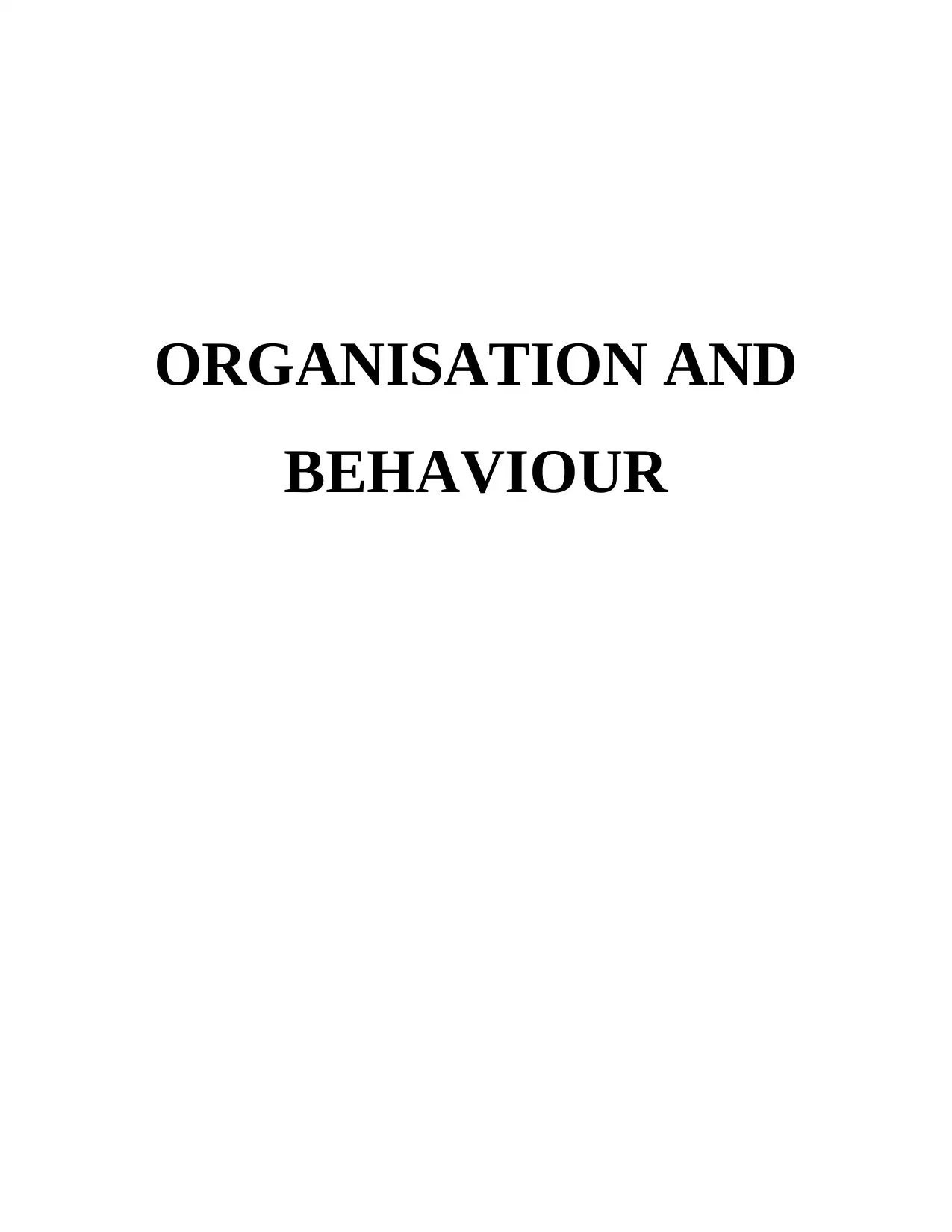
ORGANISATION AND
BEHAVIOUR
BEHAVIOUR
Paraphrase This Document
Need a fresh take? Get an instant paraphrase of this document with our AI Paraphraser
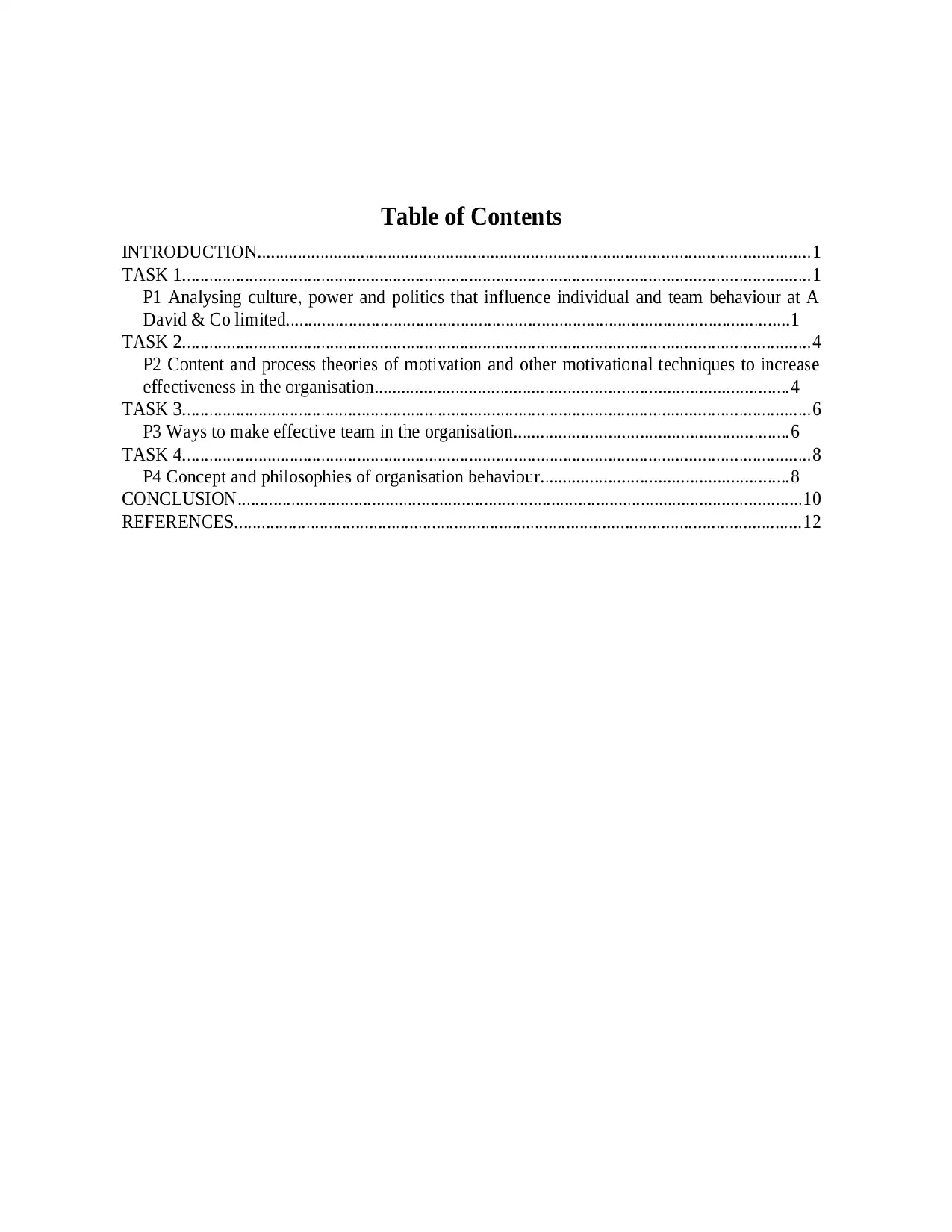
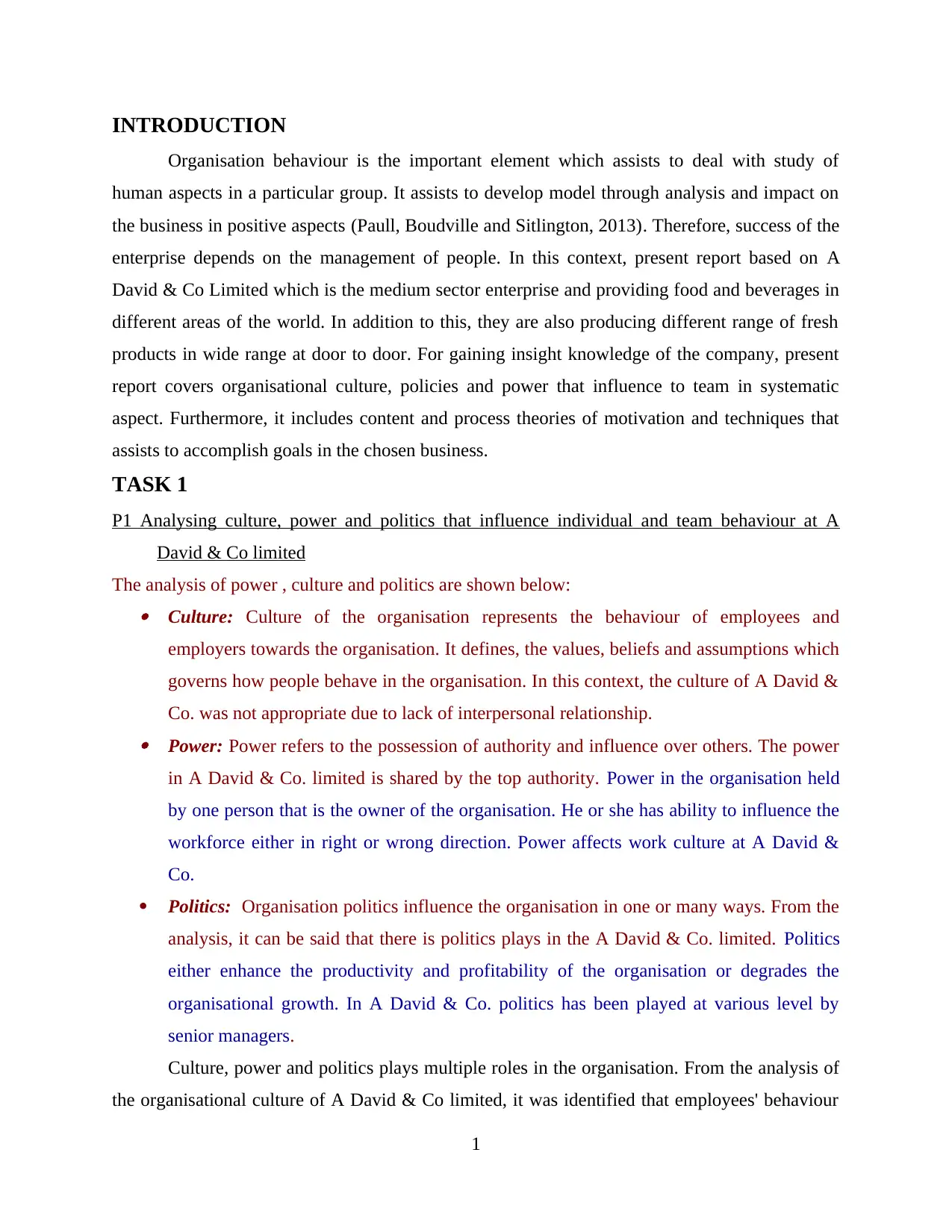
INTRODUCTION
Organisation behaviour is the important element which assists to deal with study of
human aspects in a particular group. It assists to develop model through analysis and impact on
the business in positive aspects (Paull, Boudville and Sitlington, 2013). Therefore, success of the
enterprise depends on the management of people. In this context, present report based on A
David & Co Limited which is the medium sector enterprise and providing food and beverages in
different areas of the world. In addition to this, they are also producing different range of fresh
products in wide range at door to door. For gaining insight knowledge of the company, present
report covers organisational culture, policies and power that influence to team in systematic
aspect. Furthermore, it includes content and process theories of motivation and techniques that
assists to accomplish goals in the chosen business.
TASK 1
P1 Analysing culture, power and politics that influence individual and team behaviour at A
David & Co limited
The analysis of power , culture and politics are shown below: Culture: Culture of the organisation represents the behaviour of employees and
employers towards the organisation. It defines, the values, beliefs and assumptions which
governs how people behave in the organisation. In this context, the culture of A David &
Co. was not appropriate due to lack of interpersonal relationship. Power: Power refers to the possession of authority and influence over others. The power
in A David & Co. limited is shared by the top authority. Power in the organisation held
by one person that is the owner of the organisation. He or she has ability to influence the
workforce either in right or wrong direction. Power affects work culture at A David &
Co.
Politics: Organisation politics influence the organisation in one or many ways. From the
analysis, it can be said that there is politics plays in the A David & Co. limited. Politics
either enhance the productivity and profitability of the organisation or degrades the
organisational growth. In A David & Co. politics has been played at various level by
senior managers.
Culture, power and politics plays multiple roles in the organisation. From the analysis of
the organisational culture of A David & Co limited, it was identified that employees' behaviour
1
Organisation behaviour is the important element which assists to deal with study of
human aspects in a particular group. It assists to develop model through analysis and impact on
the business in positive aspects (Paull, Boudville and Sitlington, 2013). Therefore, success of the
enterprise depends on the management of people. In this context, present report based on A
David & Co Limited which is the medium sector enterprise and providing food and beverages in
different areas of the world. In addition to this, they are also producing different range of fresh
products in wide range at door to door. For gaining insight knowledge of the company, present
report covers organisational culture, policies and power that influence to team in systematic
aspect. Furthermore, it includes content and process theories of motivation and techniques that
assists to accomplish goals in the chosen business.
TASK 1
P1 Analysing culture, power and politics that influence individual and team behaviour at A
David & Co limited
The analysis of power , culture and politics are shown below: Culture: Culture of the organisation represents the behaviour of employees and
employers towards the organisation. It defines, the values, beliefs and assumptions which
governs how people behave in the organisation. In this context, the culture of A David &
Co. was not appropriate due to lack of interpersonal relationship. Power: Power refers to the possession of authority and influence over others. The power
in A David & Co. limited is shared by the top authority. Power in the organisation held
by one person that is the owner of the organisation. He or she has ability to influence the
workforce either in right or wrong direction. Power affects work culture at A David &
Co.
Politics: Organisation politics influence the organisation in one or many ways. From the
analysis, it can be said that there is politics plays in the A David & Co. limited. Politics
either enhance the productivity and profitability of the organisation or degrades the
organisational growth. In A David & Co. politics has been played at various level by
senior managers.
Culture, power and politics plays multiple roles in the organisation. From the analysis of
the organisational culture of A David & Co limited, it was identified that employees' behaviour
1
⊘ This is a preview!⊘
Do you want full access?
Subscribe today to unlock all pages.

Trusted by 1+ million students worldwide
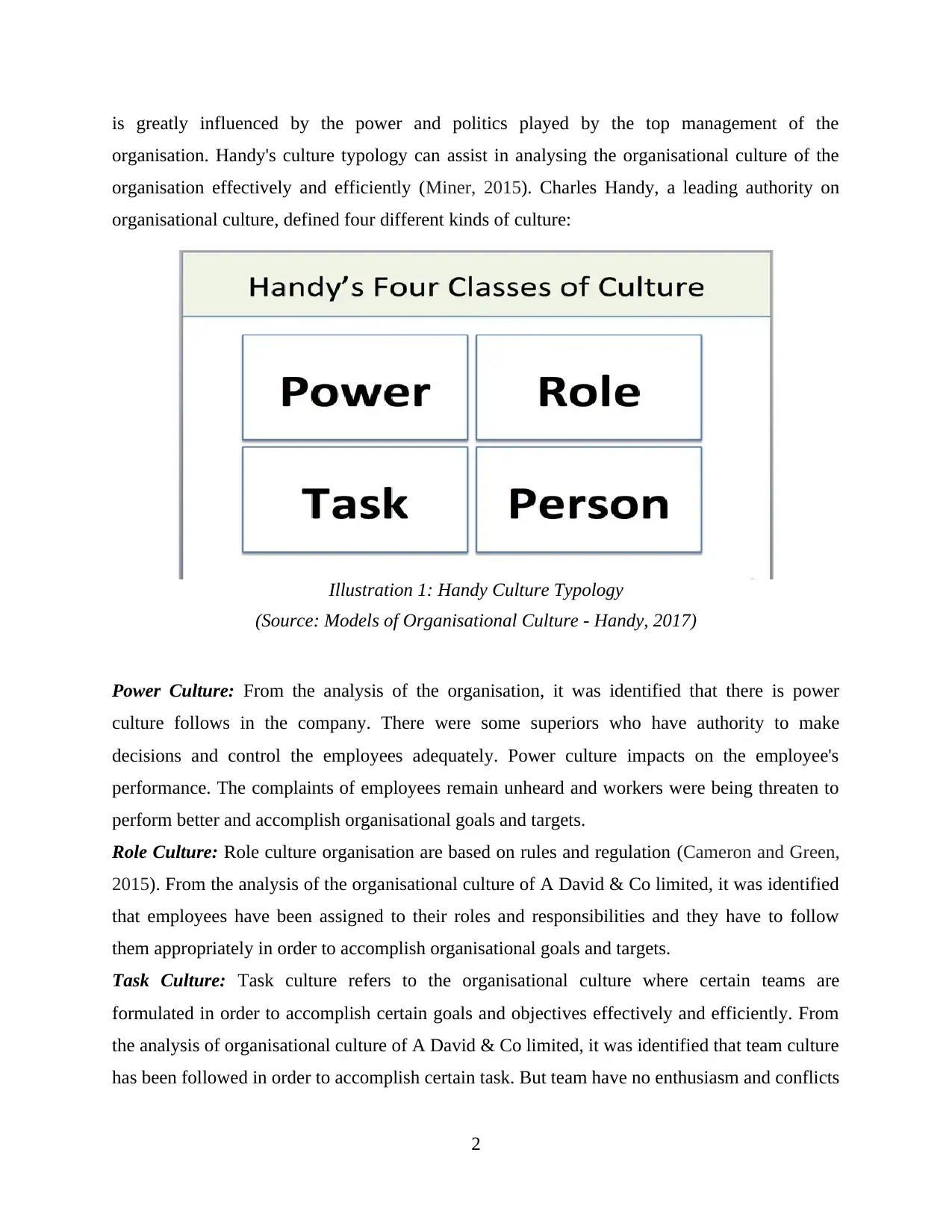
is greatly influenced by the power and politics played by the top management of the
organisation. Handy's culture typology can assist in analysing the organisational culture of the
organisation effectively and efficiently (Miner, 2015). Charles Handy, a leading authority on
organisational culture, defined four different kinds of culture:
Power Culture: From the analysis of the organisation, it was identified that there is power
culture follows in the company. There were some superiors who have authority to make
decisions and control the employees adequately. Power culture impacts on the employee's
performance. The complaints of employees remain unheard and workers were being threaten to
perform better and accomplish organisational goals and targets.
Role Culture: Role culture organisation are based on rules and regulation (Cameron and Green,
2015). From the analysis of the organisational culture of A David & Co limited, it was identified
that employees have been assigned to their roles and responsibilities and they have to follow
them appropriately in order to accomplish organisational goals and targets.
Task Culture: Task culture refers to the organisational culture where certain teams are
formulated in order to accomplish certain goals and objectives effectively and efficiently. From
the analysis of organisational culture of A David & Co limited, it was identified that team culture
has been followed in order to accomplish certain task. But team have no enthusiasm and conflicts
2
Illustration 1: Handy Culture Typology
(Source: Models of Organisational Culture - Handy, 2017)
organisation. Handy's culture typology can assist in analysing the organisational culture of the
organisation effectively and efficiently (Miner, 2015). Charles Handy, a leading authority on
organisational culture, defined four different kinds of culture:
Power Culture: From the analysis of the organisation, it was identified that there is power
culture follows in the company. There were some superiors who have authority to make
decisions and control the employees adequately. Power culture impacts on the employee's
performance. The complaints of employees remain unheard and workers were being threaten to
perform better and accomplish organisational goals and targets.
Role Culture: Role culture organisation are based on rules and regulation (Cameron and Green,
2015). From the analysis of the organisational culture of A David & Co limited, it was identified
that employees have been assigned to their roles and responsibilities and they have to follow
them appropriately in order to accomplish organisational goals and targets.
Task Culture: Task culture refers to the organisational culture where certain teams are
formulated in order to accomplish certain goals and objectives effectively and efficiently. From
the analysis of organisational culture of A David & Co limited, it was identified that team culture
has been followed in order to accomplish certain task. But team have no enthusiasm and conflicts
2
Illustration 1: Handy Culture Typology
(Source: Models of Organisational Culture - Handy, 2017)
Paraphrase This Document
Need a fresh take? Get an instant paraphrase of this document with our AI Paraphraser
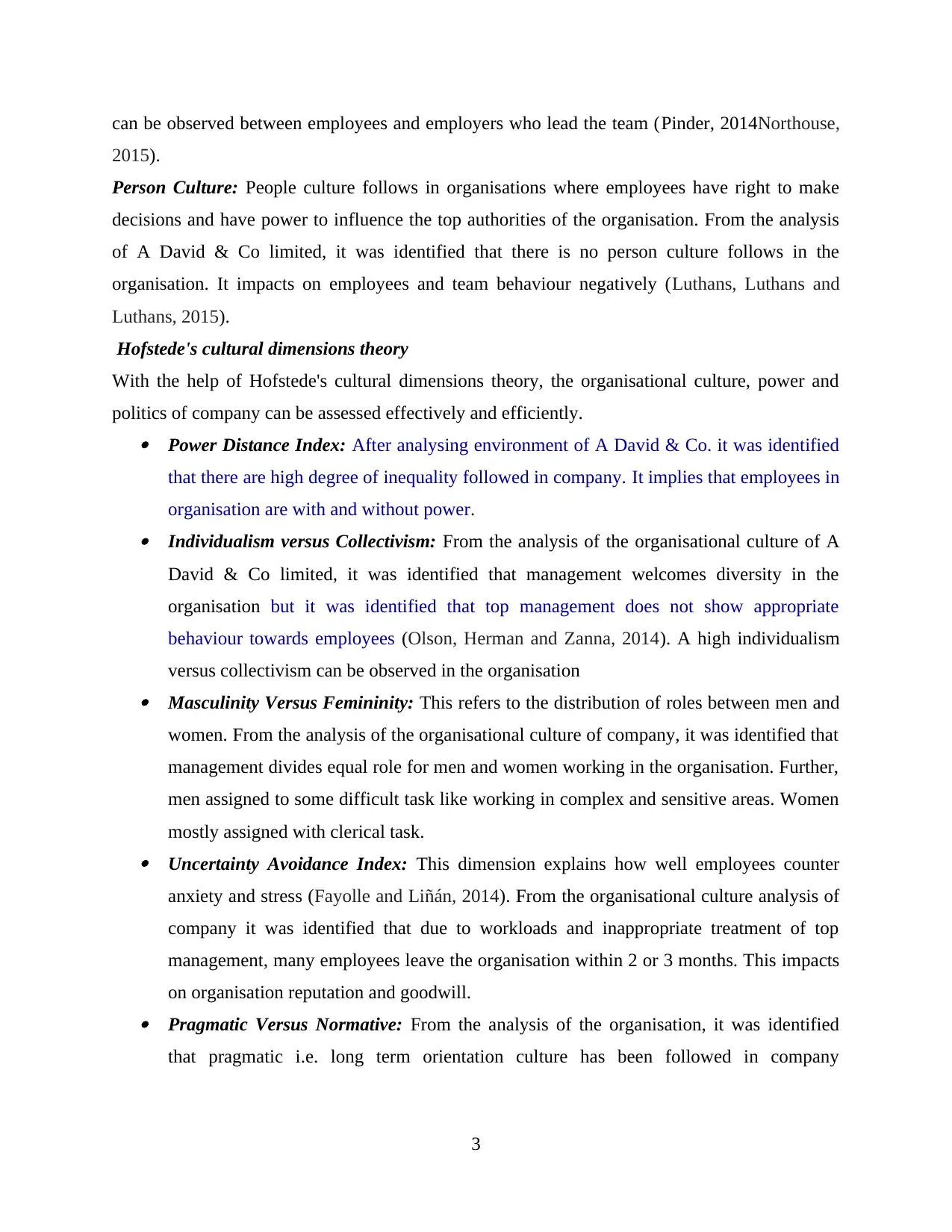
can be observed between employees and employers who lead the team (Pinder, 2014Northouse,
2015).
Person Culture: People culture follows in organisations where employees have right to make
decisions and have power to influence the top authorities of the organisation. From the analysis
of A David & Co limited, it was identified that there is no person culture follows in the
organisation. It impacts on employees and team behaviour negatively (Luthans, Luthans and
Luthans, 2015).
Hofstede's cultural dimensions theory
With the help of Hofstede's cultural dimensions theory, the organisational culture, power and
politics of company can be assessed effectively and efficiently. Power Distance Index: After analysing environment of A David & Co. it was identified
that there are high degree of inequality followed in company. It implies that employees in
organisation are with and without power. Individualism versus Collectivism: From the analysis of the organisational culture of A
David & Co limited, it was identified that management welcomes diversity in the
organisation but it was identified that top management does not show appropriate
behaviour towards employees (Olson, Herman and Zanna, 2014). A high individualism
versus collectivism can be observed in the organisation Masculinity Versus Femininity: This refers to the distribution of roles between men and
women. From the analysis of the organisational culture of company, it was identified that
management divides equal role for men and women working in the organisation. Further,
men assigned to some difficult task like working in complex and sensitive areas. Women
mostly assigned with clerical task. Uncertainty Avoidance Index: This dimension explains how well employees counter
anxiety and stress (Fayolle and Liñán, 2014). From the organisational culture analysis of
company it was identified that due to workloads and inappropriate treatment of top
management, many employees leave the organisation within 2 or 3 months. This impacts
on organisation reputation and goodwill. Pragmatic Versus Normative: From the analysis of the organisation, it was identified
that pragmatic i.e. long term orientation culture has been followed in company
3
2015).
Person Culture: People culture follows in organisations where employees have right to make
decisions and have power to influence the top authorities of the organisation. From the analysis
of A David & Co limited, it was identified that there is no person culture follows in the
organisation. It impacts on employees and team behaviour negatively (Luthans, Luthans and
Luthans, 2015).
Hofstede's cultural dimensions theory
With the help of Hofstede's cultural dimensions theory, the organisational culture, power and
politics of company can be assessed effectively and efficiently. Power Distance Index: After analysing environment of A David & Co. it was identified
that there are high degree of inequality followed in company. It implies that employees in
organisation are with and without power. Individualism versus Collectivism: From the analysis of the organisational culture of A
David & Co limited, it was identified that management welcomes diversity in the
organisation but it was identified that top management does not show appropriate
behaviour towards employees (Olson, Herman and Zanna, 2014). A high individualism
versus collectivism can be observed in the organisation Masculinity Versus Femininity: This refers to the distribution of roles between men and
women. From the analysis of the organisational culture of company, it was identified that
management divides equal role for men and women working in the organisation. Further,
men assigned to some difficult task like working in complex and sensitive areas. Women
mostly assigned with clerical task. Uncertainty Avoidance Index: This dimension explains how well employees counter
anxiety and stress (Fayolle and Liñán, 2014). From the organisational culture analysis of
company it was identified that due to workloads and inappropriate treatment of top
management, many employees leave the organisation within 2 or 3 months. This impacts
on organisation reputation and goodwill. Pragmatic Versus Normative: From the analysis of the organisation, it was identified
that pragmatic i.e. long term orientation culture has been followed in company
3
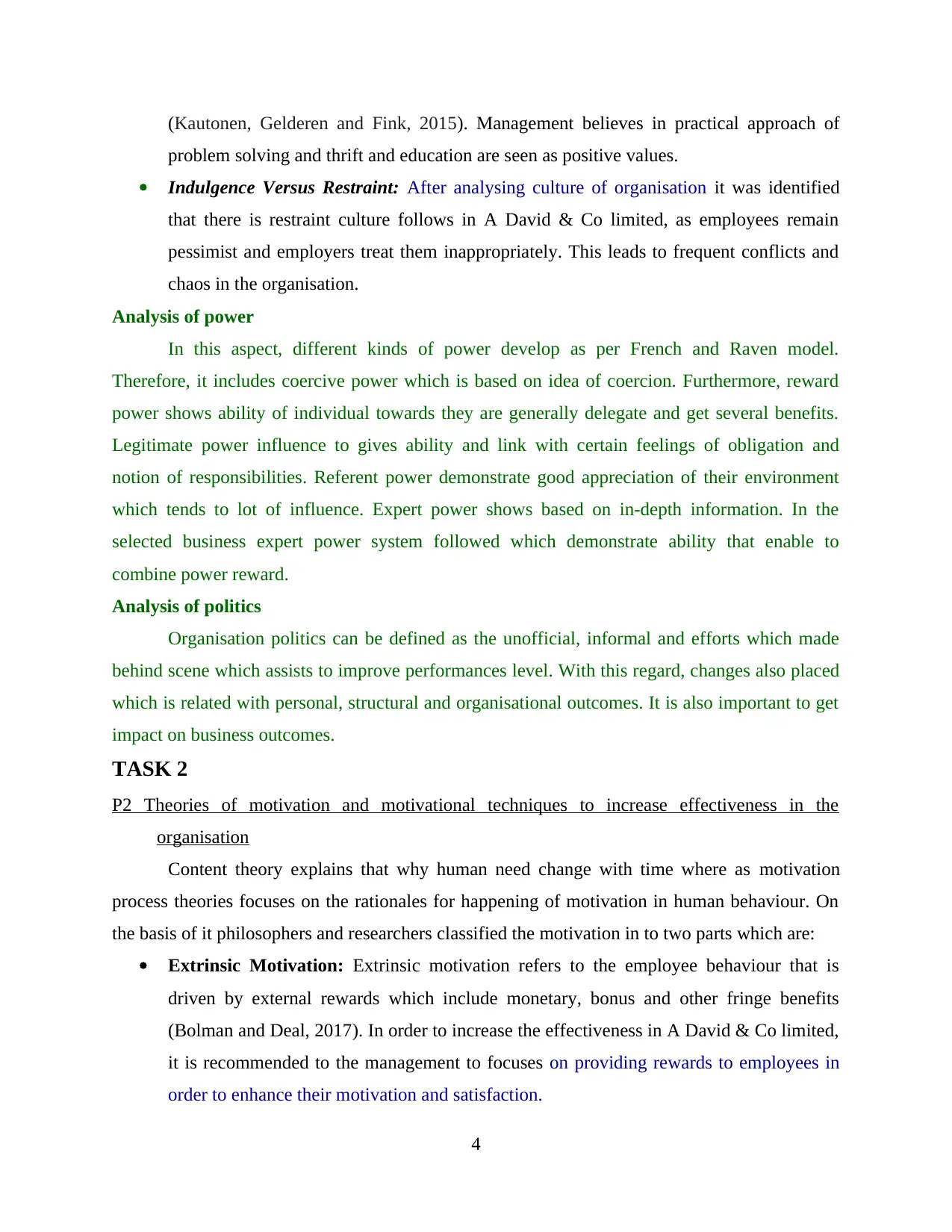
(Kautonen, Gelderen and Fink, 2015). Management believes in practical approach of
problem solving and thrift and education are seen as positive values.
Indulgence Versus Restraint: After analysing culture of organisation it was identified
that there is restraint culture follows in A David & Co limited, as employees remain
pessimist and employers treat them inappropriately. This leads to frequent conflicts and
chaos in the organisation.
Analysis of power
In this aspect, different kinds of power develop as per French and Raven model.
Therefore, it includes coercive power which is based on idea of coercion. Furthermore, reward
power shows ability of individual towards they are generally delegate and get several benefits.
Legitimate power influence to gives ability and link with certain feelings of obligation and
notion of responsibilities. Referent power demonstrate good appreciation of their environment
which tends to lot of influence. Expert power shows based on in-depth information. In the
selected business expert power system followed which demonstrate ability that enable to
combine power reward.
Analysis of politics
Organisation politics can be defined as the unofficial, informal and efforts which made
behind scene which assists to improve performances level. With this regard, changes also placed
which is related with personal, structural and organisational outcomes. It is also important to get
impact on business outcomes.
TASK 2
P2 Theories of motivation and motivational techniques to increase effectiveness in the
organisation
Content theory explains that why human need change with time where as motivation
process theories focuses on the rationales for happening of motivation in human behaviour. On
the basis of it philosophers and researchers classified the motivation in to two parts which are:
Extrinsic Motivation: Extrinsic motivation refers to the employee behaviour that is
driven by external rewards which include monetary, bonus and other fringe benefits
(Bolman and Deal, 2017). In order to increase the effectiveness in A David & Co limited,
it is recommended to the management to focuses on providing rewards to employees in
order to enhance their motivation and satisfaction.
4
problem solving and thrift and education are seen as positive values.
Indulgence Versus Restraint: After analysing culture of organisation it was identified
that there is restraint culture follows in A David & Co limited, as employees remain
pessimist and employers treat them inappropriately. This leads to frequent conflicts and
chaos in the organisation.
Analysis of power
In this aspect, different kinds of power develop as per French and Raven model.
Therefore, it includes coercive power which is based on idea of coercion. Furthermore, reward
power shows ability of individual towards they are generally delegate and get several benefits.
Legitimate power influence to gives ability and link with certain feelings of obligation and
notion of responsibilities. Referent power demonstrate good appreciation of their environment
which tends to lot of influence. Expert power shows based on in-depth information. In the
selected business expert power system followed which demonstrate ability that enable to
combine power reward.
Analysis of politics
Organisation politics can be defined as the unofficial, informal and efforts which made
behind scene which assists to improve performances level. With this regard, changes also placed
which is related with personal, structural and organisational outcomes. It is also important to get
impact on business outcomes.
TASK 2
P2 Theories of motivation and motivational techniques to increase effectiveness in the
organisation
Content theory explains that why human need change with time where as motivation
process theories focuses on the rationales for happening of motivation in human behaviour. On
the basis of it philosophers and researchers classified the motivation in to two parts which are:
Extrinsic Motivation: Extrinsic motivation refers to the employee behaviour that is
driven by external rewards which include monetary, bonus and other fringe benefits
(Bolman and Deal, 2017). In order to increase the effectiveness in A David & Co limited,
it is recommended to the management to focuses on providing rewards to employees in
order to enhance their motivation and satisfaction.
4
⊘ This is a preview!⊘
Do you want full access?
Subscribe today to unlock all pages.

Trusted by 1+ million students worldwide
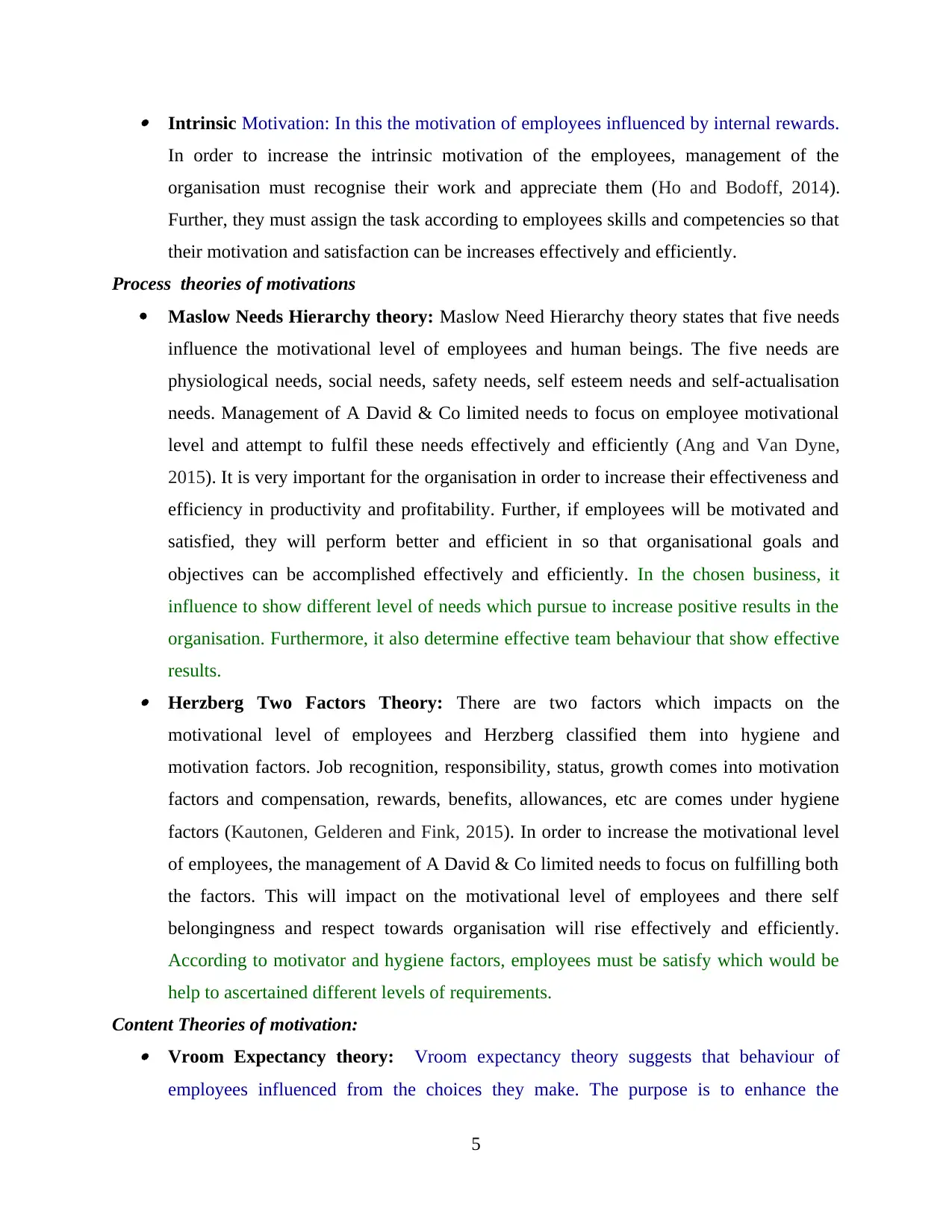
Intrinsic Motivation: In this the motivation of employees influenced by internal rewards.
In order to increase the intrinsic motivation of the employees, management of the
organisation must recognise their work and appreciate them (Ho and Bodoff, 2014).
Further, they must assign the task according to employees skills and competencies so that
their motivation and satisfaction can be increases effectively and efficiently.
Process theories of motivations
Maslow Needs Hierarchy theory: Maslow Need Hierarchy theory states that five needs
influence the motivational level of employees and human beings. The five needs are
physiological needs, social needs, safety needs, self esteem needs and self-actualisation
needs. Management of A David & Co limited needs to focus on employee motivational
level and attempt to fulfil these needs effectively and efficiently (Ang and Van Dyne,
2015). It is very important for the organisation in order to increase their effectiveness and
efficiency in productivity and profitability. Further, if employees will be motivated and
satisfied, they will perform better and efficient in so that organisational goals and
objectives can be accomplished effectively and efficiently. In the chosen business, it
influence to show different level of needs which pursue to increase positive results in the
organisation. Furthermore, it also determine effective team behaviour that show effective
results. Herzberg Two Factors Theory: There are two factors which impacts on the
motivational level of employees and Herzberg classified them into hygiene and
motivation factors. Job recognition, responsibility, status, growth comes into motivation
factors and compensation, rewards, benefits, allowances, etc are comes under hygiene
factors (Kautonen, Gelderen and Fink, 2015). In order to increase the motivational level
of employees, the management of A David & Co limited needs to focus on fulfilling both
the factors. This will impact on the motivational level of employees and there self
belongingness and respect towards organisation will rise effectively and efficiently.
According to motivator and hygiene factors, employees must be satisfy which would be
help to ascertained different levels of requirements.
Content Theories of motivation: Vroom Expectancy theory: Vroom expectancy theory suggests that behaviour of
employees influenced from the choices they make. The purpose is to enhance the
5
In order to increase the intrinsic motivation of the employees, management of the
organisation must recognise their work and appreciate them (Ho and Bodoff, 2014).
Further, they must assign the task according to employees skills and competencies so that
their motivation and satisfaction can be increases effectively and efficiently.
Process theories of motivations
Maslow Needs Hierarchy theory: Maslow Need Hierarchy theory states that five needs
influence the motivational level of employees and human beings. The five needs are
physiological needs, social needs, safety needs, self esteem needs and self-actualisation
needs. Management of A David & Co limited needs to focus on employee motivational
level and attempt to fulfil these needs effectively and efficiently (Ang and Van Dyne,
2015). It is very important for the organisation in order to increase their effectiveness and
efficiency in productivity and profitability. Further, if employees will be motivated and
satisfied, they will perform better and efficient in so that organisational goals and
objectives can be accomplished effectively and efficiently. In the chosen business, it
influence to show different level of needs which pursue to increase positive results in the
organisation. Furthermore, it also determine effective team behaviour that show effective
results. Herzberg Two Factors Theory: There are two factors which impacts on the
motivational level of employees and Herzberg classified them into hygiene and
motivation factors. Job recognition, responsibility, status, growth comes into motivation
factors and compensation, rewards, benefits, allowances, etc are comes under hygiene
factors (Kautonen, Gelderen and Fink, 2015). In order to increase the motivational level
of employees, the management of A David & Co limited needs to focus on fulfilling both
the factors. This will impact on the motivational level of employees and there self
belongingness and respect towards organisation will rise effectively and efficiently.
According to motivator and hygiene factors, employees must be satisfy which would be
help to ascertained different levels of requirements.
Content Theories of motivation: Vroom Expectancy theory: Vroom expectancy theory suggests that behaviour of
employees influenced from the choices they make. The purpose is to enhance the
5
Paraphrase This Document
Need a fresh take? Get an instant paraphrase of this document with our AI Paraphraser
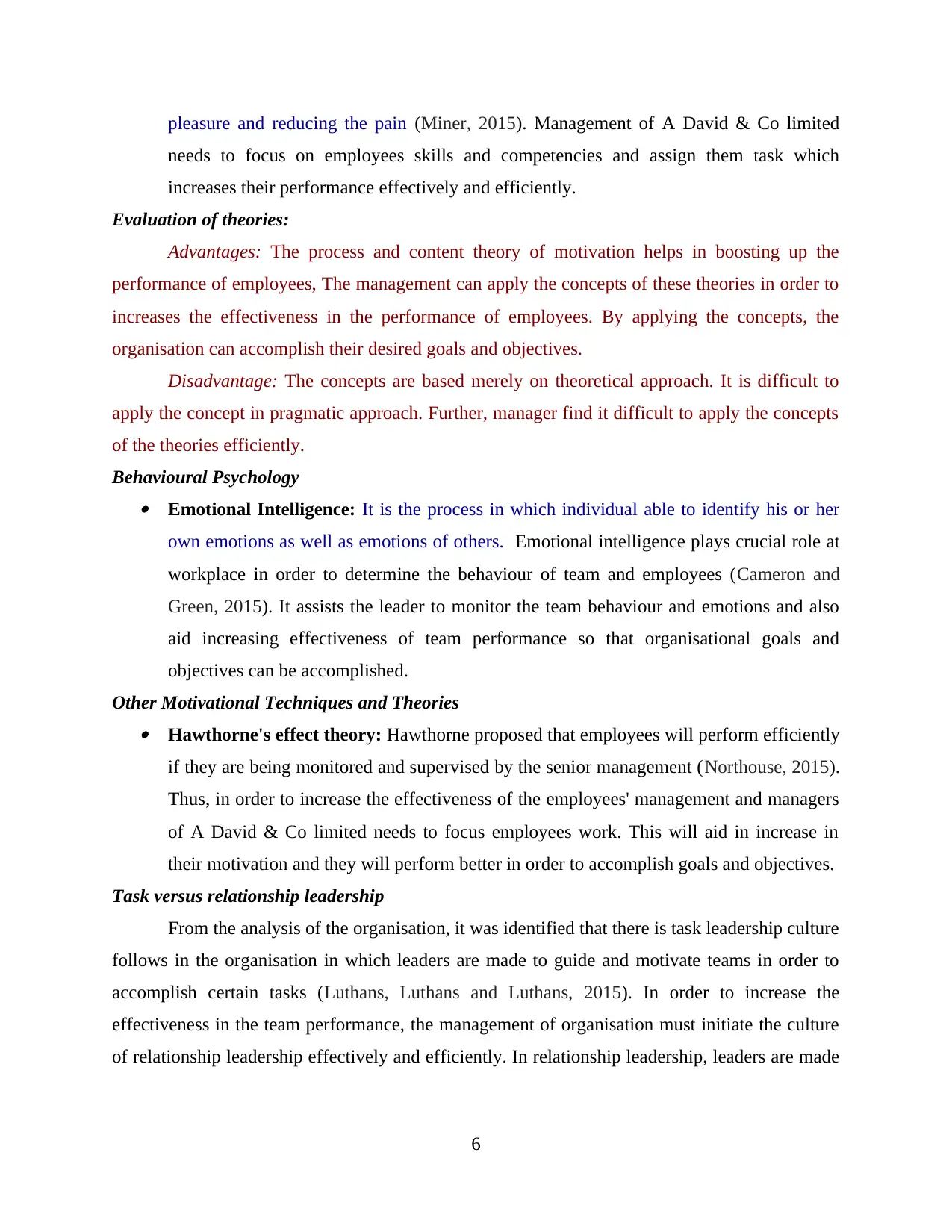
pleasure and reducing the pain (Miner, 2015). Management of A David & Co limited
needs to focus on employees skills and competencies and assign them task which
increases their performance effectively and efficiently.
Evaluation of theories:
Advantages: The process and content theory of motivation helps in boosting up the
performance of employees, The management can apply the concepts of these theories in order to
increases the effectiveness in the performance of employees. By applying the concepts, the
organisation can accomplish their desired goals and objectives.
Disadvantage: The concepts are based merely on theoretical approach. It is difficult to
apply the concept in pragmatic approach. Further, manager find it difficult to apply the concepts
of the theories efficiently.
Behavioural Psychology Emotional Intelligence: It is the process in which individual able to identify his or her
own emotions as well as emotions of others. Emotional intelligence plays crucial role at
workplace in order to determine the behaviour of team and employees (Cameron and
Green, 2015). It assists the leader to monitor the team behaviour and emotions and also
aid increasing effectiveness of team performance so that organisational goals and
objectives can be accomplished.
Other Motivational Techniques and Theories Hawthorne's effect theory: Hawthorne proposed that employees will perform efficiently
if they are being monitored and supervised by the senior management (Northouse, 2015).
Thus, in order to increase the effectiveness of the employees' management and managers
of A David & Co limited needs to focus employees work. This will aid in increase in
their motivation and they will perform better in order to accomplish goals and objectives.
Task versus relationship leadership
From the analysis of the organisation, it was identified that there is task leadership culture
follows in the organisation in which leaders are made to guide and motivate teams in order to
accomplish certain tasks (Luthans, Luthans and Luthans, 2015). In order to increase the
effectiveness in the team performance, the management of organisation must initiate the culture
of relationship leadership effectively and efficiently. In relationship leadership, leaders are made
6
needs to focus on employees skills and competencies and assign them task which
increases their performance effectively and efficiently.
Evaluation of theories:
Advantages: The process and content theory of motivation helps in boosting up the
performance of employees, The management can apply the concepts of these theories in order to
increases the effectiveness in the performance of employees. By applying the concepts, the
organisation can accomplish their desired goals and objectives.
Disadvantage: The concepts are based merely on theoretical approach. It is difficult to
apply the concept in pragmatic approach. Further, manager find it difficult to apply the concepts
of the theories efficiently.
Behavioural Psychology Emotional Intelligence: It is the process in which individual able to identify his or her
own emotions as well as emotions of others. Emotional intelligence plays crucial role at
workplace in order to determine the behaviour of team and employees (Cameron and
Green, 2015). It assists the leader to monitor the team behaviour and emotions and also
aid increasing effectiveness of team performance so that organisational goals and
objectives can be accomplished.
Other Motivational Techniques and Theories Hawthorne's effect theory: Hawthorne proposed that employees will perform efficiently
if they are being monitored and supervised by the senior management (Northouse, 2015).
Thus, in order to increase the effectiveness of the employees' management and managers
of A David & Co limited needs to focus employees work. This will aid in increase in
their motivation and they will perform better in order to accomplish goals and objectives.
Task versus relationship leadership
From the analysis of the organisation, it was identified that there is task leadership culture
follows in the organisation in which leaders are made to guide and motivate teams in order to
accomplish certain tasks (Luthans, Luthans and Luthans, 2015). In order to increase the
effectiveness in the team performance, the management of organisation must initiate the culture
of relationship leadership effectively and efficiently. In relationship leadership, leaders are made
6
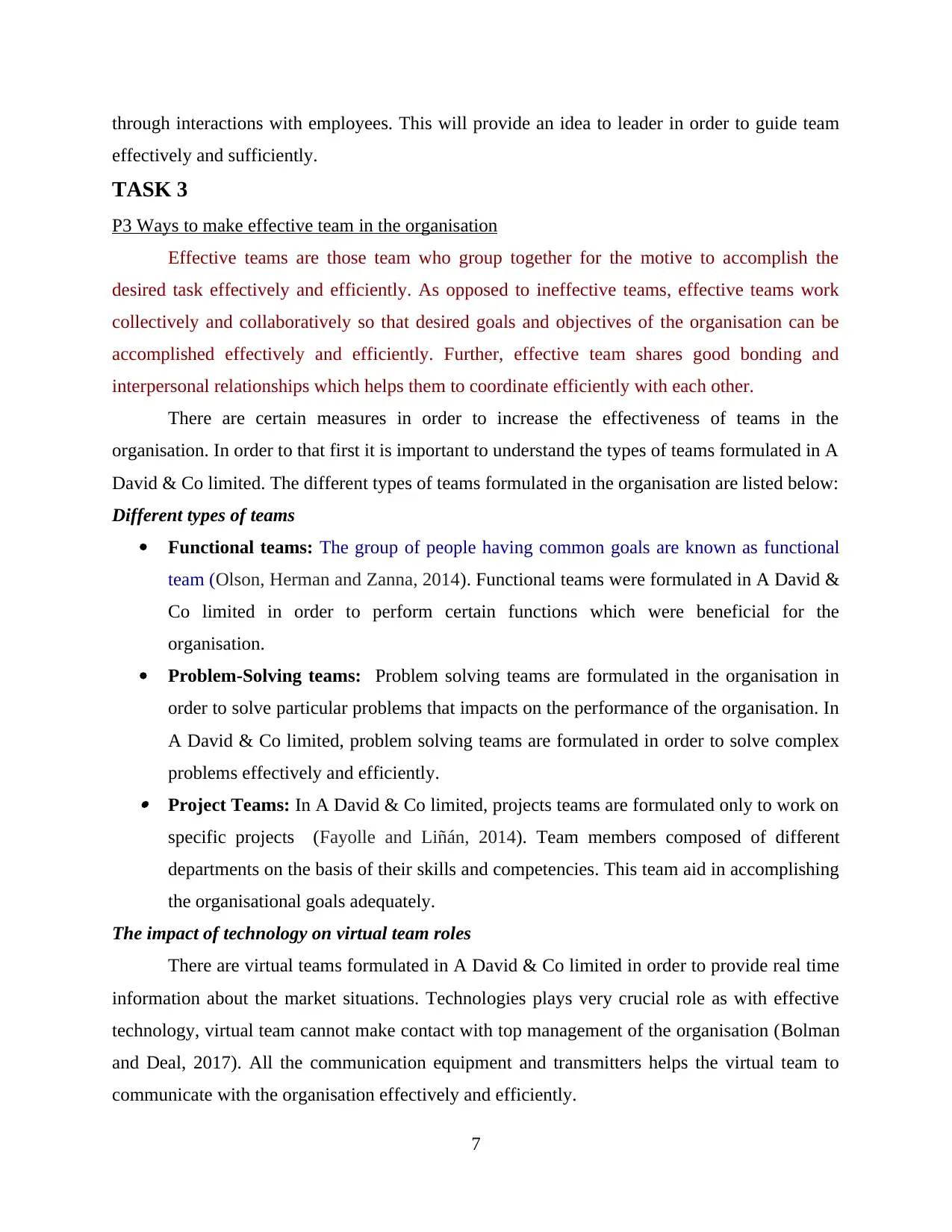
through interactions with employees. This will provide an idea to leader in order to guide team
effectively and sufficiently.
TASK 3
P3 Ways to make effective team in the organisation
Effective teams are those team who group together for the motive to accomplish the
desired task effectively and efficiently. As opposed to ineffective teams, effective teams work
collectively and collaboratively so that desired goals and objectives of the organisation can be
accomplished effectively and efficiently. Further, effective team shares good bonding and
interpersonal relationships which helps them to coordinate efficiently with each other.
There are certain measures in order to increase the effectiveness of teams in the
organisation. In order to that first it is important to understand the types of teams formulated in A
David & Co limited. The different types of teams formulated in the organisation are listed below:
Different types of teams
Functional teams: The group of people having common goals are known as functional
team (Olson, Herman and Zanna, 2014). Functional teams were formulated in A David &
Co limited in order to perform certain functions which were beneficial for the
organisation.
Problem-Solving teams: Problem solving teams are formulated in the organisation in
order to solve particular problems that impacts on the performance of the organisation. In
A David & Co limited, problem solving teams are formulated in order to solve complex
problems effectively and efficiently. Project Teams: In A David & Co limited, projects teams are formulated only to work on
specific projects (Fayolle and Liñán, 2014). Team members composed of different
departments on the basis of their skills and competencies. This team aid in accomplishing
the organisational goals adequately.
The impact of technology on virtual team roles
There are virtual teams formulated in A David & Co limited in order to provide real time
information about the market situations. Technologies plays very crucial role as with effective
technology, virtual team cannot make contact with top management of the organisation (Bolman
and Deal, 2017). All the communication equipment and transmitters helps the virtual team to
communicate with the organisation effectively and efficiently.
7
effectively and sufficiently.
TASK 3
P3 Ways to make effective team in the organisation
Effective teams are those team who group together for the motive to accomplish the
desired task effectively and efficiently. As opposed to ineffective teams, effective teams work
collectively and collaboratively so that desired goals and objectives of the organisation can be
accomplished effectively and efficiently. Further, effective team shares good bonding and
interpersonal relationships which helps them to coordinate efficiently with each other.
There are certain measures in order to increase the effectiveness of teams in the
organisation. In order to that first it is important to understand the types of teams formulated in A
David & Co limited. The different types of teams formulated in the organisation are listed below:
Different types of teams
Functional teams: The group of people having common goals are known as functional
team (Olson, Herman and Zanna, 2014). Functional teams were formulated in A David &
Co limited in order to perform certain functions which were beneficial for the
organisation.
Problem-Solving teams: Problem solving teams are formulated in the organisation in
order to solve particular problems that impacts on the performance of the organisation. In
A David & Co limited, problem solving teams are formulated in order to solve complex
problems effectively and efficiently. Project Teams: In A David & Co limited, projects teams are formulated only to work on
specific projects (Fayolle and Liñán, 2014). Team members composed of different
departments on the basis of their skills and competencies. This team aid in accomplishing
the organisational goals adequately.
The impact of technology on virtual team roles
There are virtual teams formulated in A David & Co limited in order to provide real time
information about the market situations. Technologies plays very crucial role as with effective
technology, virtual team cannot make contact with top management of the organisation (Bolman
and Deal, 2017). All the communication equipment and transmitters helps the virtual team to
communicate with the organisation effectively and efficiently.
7
⊘ This is a preview!⊘
Do you want full access?
Subscribe today to unlock all pages.

Trusted by 1+ million students worldwide
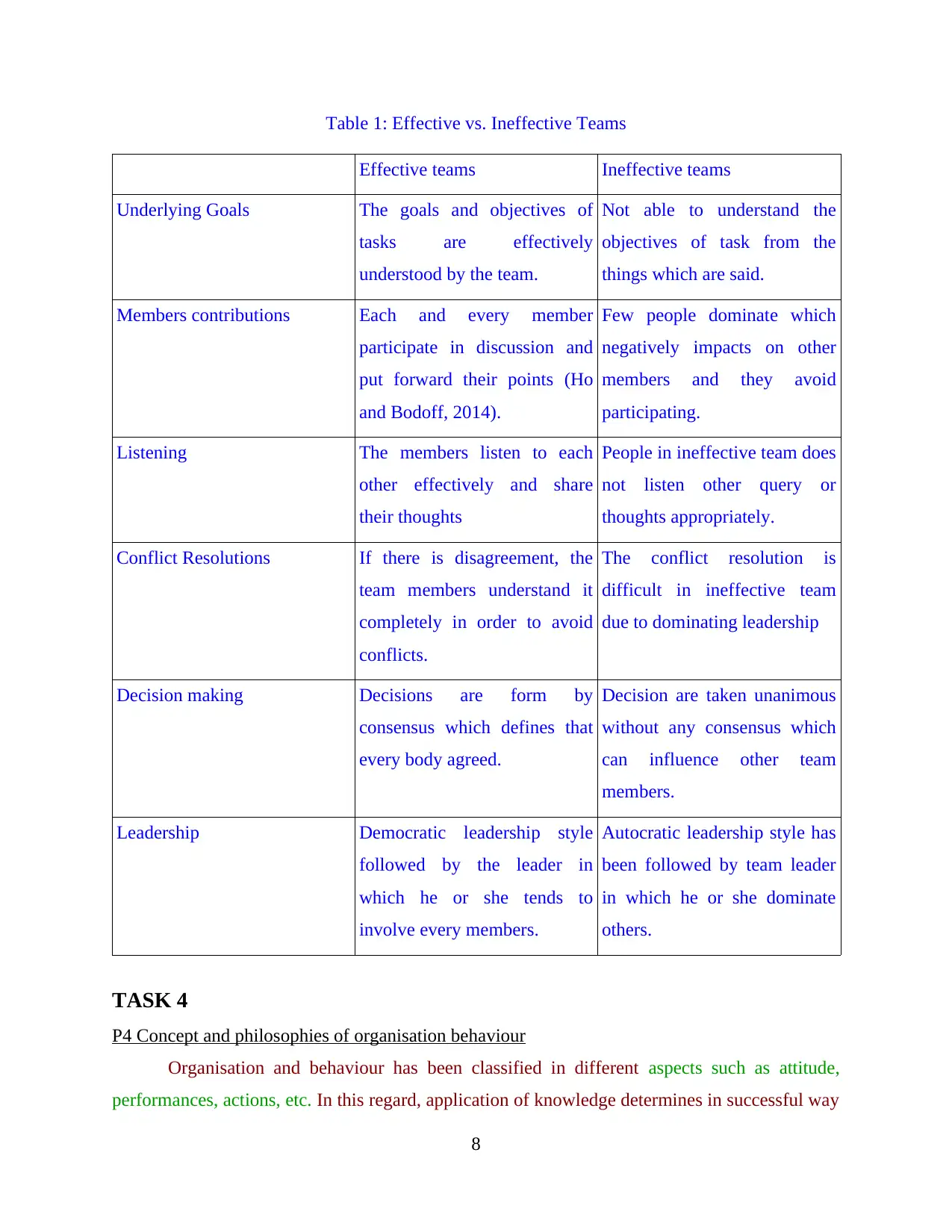
Table 1: Effective vs. Ineffective Teams
Effective teams Ineffective teams
Underlying Goals The goals and objectives of
tasks are effectively
understood by the team.
Not able to understand the
objectives of task from the
things which are said.
Members contributions Each and every member
participate in discussion and
put forward their points (Ho
and Bodoff, 2014).
Few people dominate which
negatively impacts on other
members and they avoid
participating.
Listening The members listen to each
other effectively and share
their thoughts
People in ineffective team does
not listen other query or
thoughts appropriately.
Conflict Resolutions If there is disagreement, the
team members understand it
completely in order to avoid
conflicts.
The conflict resolution is
difficult in ineffective team
due to dominating leadership
Decision making Decisions are form by
consensus which defines that
every body agreed.
Decision are taken unanimous
without any consensus which
can influence other team
members.
Leadership Democratic leadership style
followed by the leader in
which he or she tends to
involve every members.
Autocratic leadership style has
been followed by team leader
in which he or she dominate
others.
TASK 4
P4 Concept and philosophies of organisation behaviour
Organisation and behaviour has been classified in different aspects such as attitude,
performances, actions, etc. In this regard, application of knowledge determines in successful way
8
Effective teams Ineffective teams
Underlying Goals The goals and objectives of
tasks are effectively
understood by the team.
Not able to understand the
objectives of task from the
things which are said.
Members contributions Each and every member
participate in discussion and
put forward their points (Ho
and Bodoff, 2014).
Few people dominate which
negatively impacts on other
members and they avoid
participating.
Listening The members listen to each
other effectively and share
their thoughts
People in ineffective team does
not listen other query or
thoughts appropriately.
Conflict Resolutions If there is disagreement, the
team members understand it
completely in order to avoid
conflicts.
The conflict resolution is
difficult in ineffective team
due to dominating leadership
Decision making Decisions are form by
consensus which defines that
every body agreed.
Decision are taken unanimous
without any consensus which
can influence other team
members.
Leadership Democratic leadership style
followed by the leader in
which he or she tends to
involve every members.
Autocratic leadership style has
been followed by team leader
in which he or she dominate
others.
TASK 4
P4 Concept and philosophies of organisation behaviour
Organisation and behaviour has been classified in different aspects such as attitude,
performances, actions, etc. In this regard, application of knowledge determines in successful way
8
Paraphrase This Document
Need a fresh take? Get an instant paraphrase of this document with our AI Paraphraser
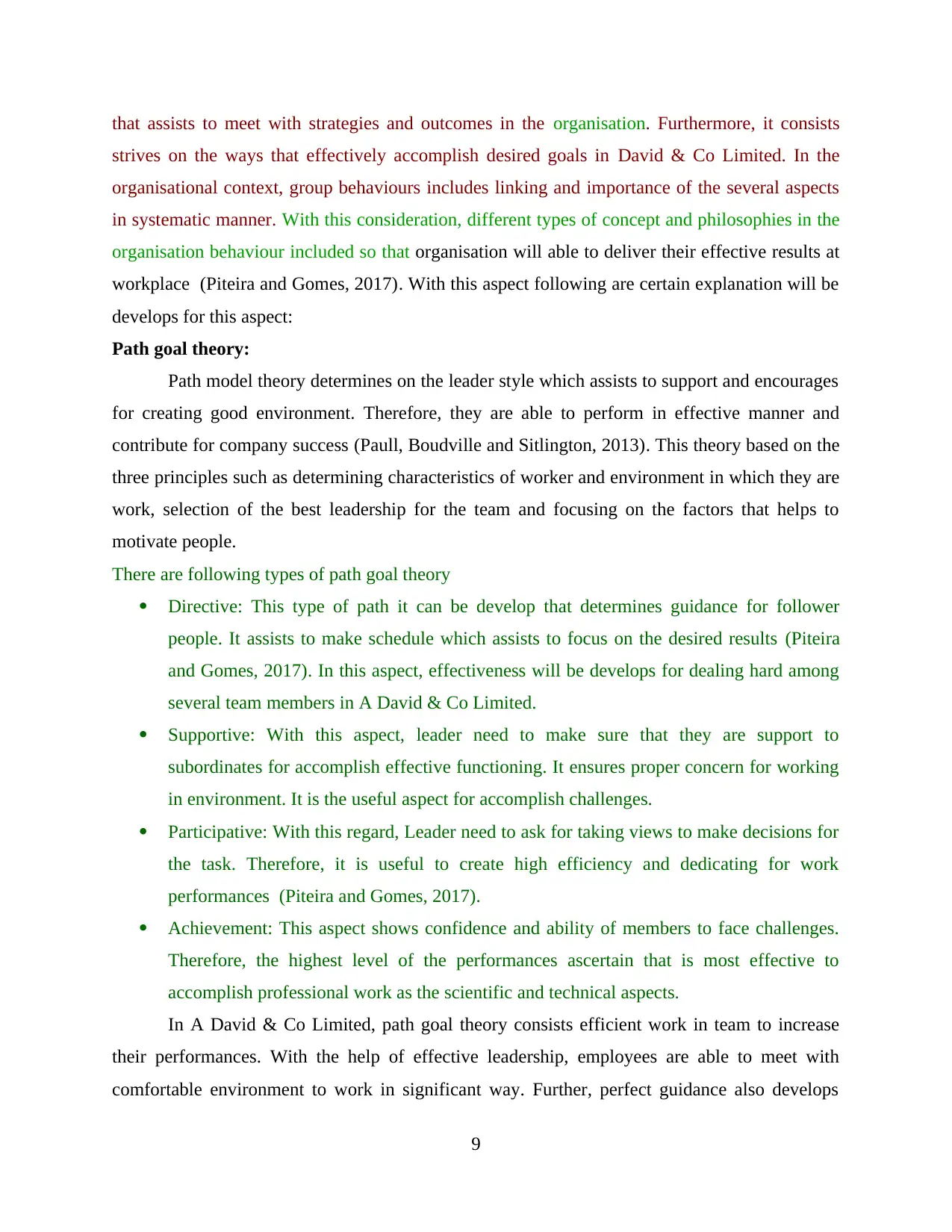
that assists to meet with strategies and outcomes in the organisation. Furthermore, it consists
strives on the ways that effectively accomplish desired goals in David & Co Limited. In the
organisational context, group behaviours includes linking and importance of the several aspects
in systematic manner. With this consideration, different types of concept and philosophies in the
organisation behaviour included so that organisation will able to deliver their effective results at
workplace (Piteira and Gomes, 2017). With this aspect following are certain explanation will be
develops for this aspect:
Path goal theory:
Path model theory determines on the leader style which assists to support and encourages
for creating good environment. Therefore, they are able to perform in effective manner and
contribute for company success (Paull, Boudville and Sitlington, 2013). This theory based on the
three principles such as determining characteristics of worker and environment in which they are
work, selection of the best leadership for the team and focusing on the factors that helps to
motivate people.
There are following types of path goal theory
Directive: This type of path it can be develop that determines guidance for follower
people. It assists to make schedule which assists to focus on the desired results (Piteira
and Gomes, 2017). In this aspect, effectiveness will be develops for dealing hard among
several team members in A David & Co Limited.
Supportive: With this aspect, leader need to make sure that they are support to
subordinates for accomplish effective functioning. It ensures proper concern for working
in environment. It is the useful aspect for accomplish challenges.
Participative: With this regard, Leader need to ask for taking views to make decisions for
the task. Therefore, it is useful to create high efficiency and dedicating for work
performances (Piteira and Gomes, 2017).
Achievement: This aspect shows confidence and ability of members to face challenges.
Therefore, the highest level of the performances ascertain that is most effective to
accomplish professional work as the scientific and technical aspects.
In A David & Co Limited, path goal theory consists efficient work in team to increase
their performances. With the help of effective leadership, employees are able to meet with
comfortable environment to work in significant way. Further, perfect guidance also develops
9
strives on the ways that effectively accomplish desired goals in David & Co Limited. In the
organisational context, group behaviours includes linking and importance of the several aspects
in systematic manner. With this consideration, different types of concept and philosophies in the
organisation behaviour included so that organisation will able to deliver their effective results at
workplace (Piteira and Gomes, 2017). With this aspect following are certain explanation will be
develops for this aspect:
Path goal theory:
Path model theory determines on the leader style which assists to support and encourages
for creating good environment. Therefore, they are able to perform in effective manner and
contribute for company success (Paull, Boudville and Sitlington, 2013). This theory based on the
three principles such as determining characteristics of worker and environment in which they are
work, selection of the best leadership for the team and focusing on the factors that helps to
motivate people.
There are following types of path goal theory
Directive: This type of path it can be develop that determines guidance for follower
people. It assists to make schedule which assists to focus on the desired results (Piteira
and Gomes, 2017). In this aspect, effectiveness will be develops for dealing hard among
several team members in A David & Co Limited.
Supportive: With this aspect, leader need to make sure that they are support to
subordinates for accomplish effective functioning. It ensures proper concern for working
in environment. It is the useful aspect for accomplish challenges.
Participative: With this regard, Leader need to ask for taking views to make decisions for
the task. Therefore, it is useful to create high efficiency and dedicating for work
performances (Piteira and Gomes, 2017).
Achievement: This aspect shows confidence and ability of members to face challenges.
Therefore, the highest level of the performances ascertain that is most effective to
accomplish professional work as the scientific and technical aspects.
In A David & Co Limited, path goal theory consists efficient work in team to increase
their performances. With the help of effective leadership, employees are able to meet with
comfortable environment to work in significant way. Further, perfect guidance also develops
9
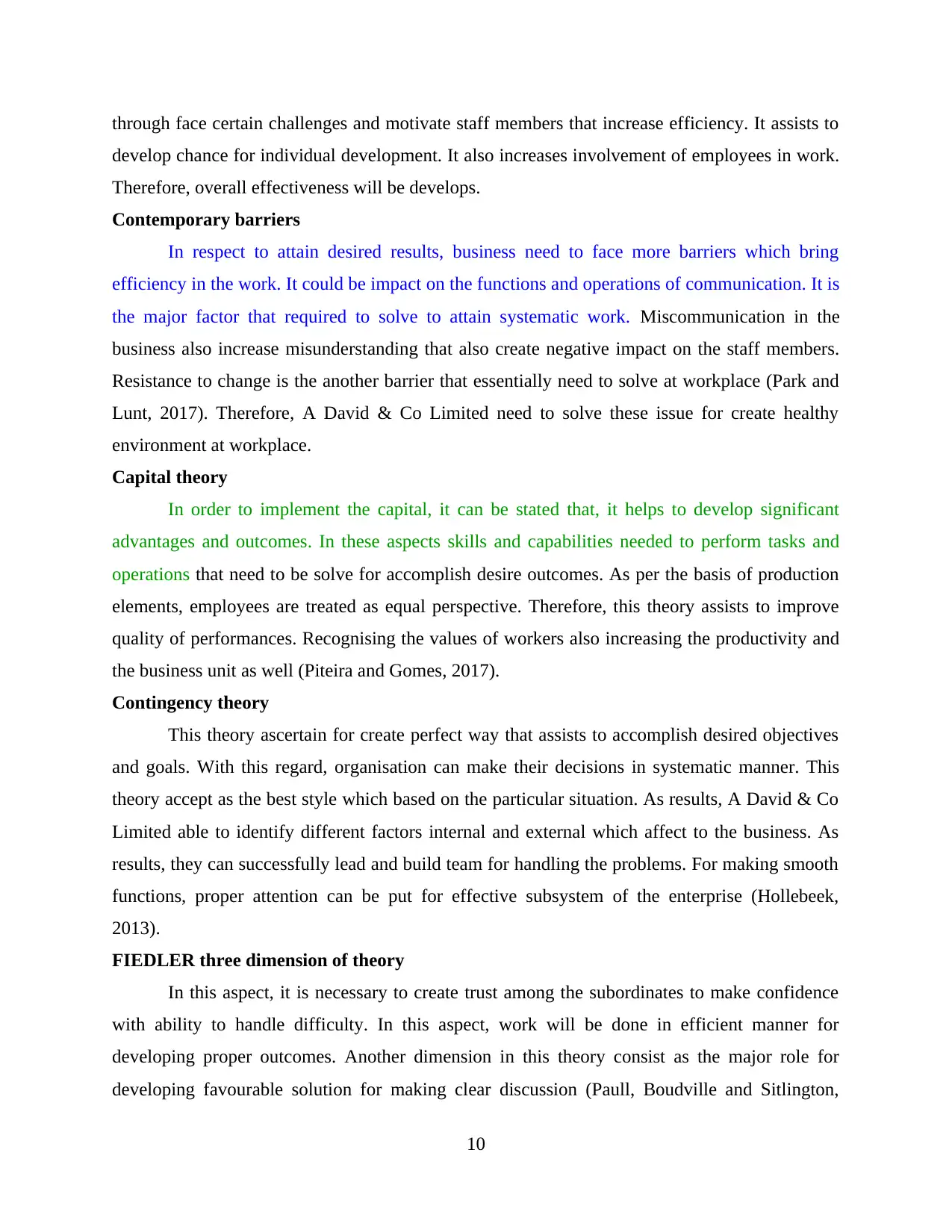
through face certain challenges and motivate staff members that increase efficiency. It assists to
develop chance for individual development. It also increases involvement of employees in work.
Therefore, overall effectiveness will be develops.
Contemporary barriers
In respect to attain desired results, business need to face more barriers which bring
efficiency in the work. It could be impact on the functions and operations of communication. It is
the major factor that required to solve to attain systematic work. Miscommunication in the
business also increase misunderstanding that also create negative impact on the staff members.
Resistance to change is the another barrier that essentially need to solve at workplace (Park and
Lunt, 2017). Therefore, A David & Co Limited need to solve these issue for create healthy
environment at workplace.
Capital theory
In order to implement the capital, it can be stated that, it helps to develop significant
advantages and outcomes. In these aspects skills and capabilities needed to perform tasks and
operations that need to be solve for accomplish desire outcomes. As per the basis of production
elements, employees are treated as equal perspective. Therefore, this theory assists to improve
quality of performances. Recognising the values of workers also increasing the productivity and
the business unit as well (Piteira and Gomes, 2017).
Contingency theory
This theory ascertain for create perfect way that assists to accomplish desired objectives
and goals. With this regard, organisation can make their decisions in systematic manner. This
theory accept as the best style which based on the particular situation. As results, A David & Co
Limited able to identify different factors internal and external which affect to the business. As
results, they can successfully lead and build team for handling the problems. For making smooth
functions, proper attention can be put for effective subsystem of the enterprise (Hollebeek,
2013).
FIEDLER three dimension of theory
In this aspect, it is necessary to create trust among the subordinates to make confidence
with ability to handle difficulty. In this aspect, work will be done in efficient manner for
developing proper outcomes. Another dimension in this theory consist as the major role for
developing favourable solution for making clear discussion (Paull, Boudville and Sitlington,
10
develop chance for individual development. It also increases involvement of employees in work.
Therefore, overall effectiveness will be develops.
Contemporary barriers
In respect to attain desired results, business need to face more barriers which bring
efficiency in the work. It could be impact on the functions and operations of communication. It is
the major factor that required to solve to attain systematic work. Miscommunication in the
business also increase misunderstanding that also create negative impact on the staff members.
Resistance to change is the another barrier that essentially need to solve at workplace (Park and
Lunt, 2017). Therefore, A David & Co Limited need to solve these issue for create healthy
environment at workplace.
Capital theory
In order to implement the capital, it can be stated that, it helps to develop significant
advantages and outcomes. In these aspects skills and capabilities needed to perform tasks and
operations that need to be solve for accomplish desire outcomes. As per the basis of production
elements, employees are treated as equal perspective. Therefore, this theory assists to improve
quality of performances. Recognising the values of workers also increasing the productivity and
the business unit as well (Piteira and Gomes, 2017).
Contingency theory
This theory ascertain for create perfect way that assists to accomplish desired objectives
and goals. With this regard, organisation can make their decisions in systematic manner. This
theory accept as the best style which based on the particular situation. As results, A David & Co
Limited able to identify different factors internal and external which affect to the business. As
results, they can successfully lead and build team for handling the problems. For making smooth
functions, proper attention can be put for effective subsystem of the enterprise (Hollebeek,
2013).
FIEDLER three dimension of theory
In this aspect, it is necessary to create trust among the subordinates to make confidence
with ability to handle difficulty. In this aspect, work will be done in efficient manner for
developing proper outcomes. Another dimension in this theory consist as the major role for
developing favourable solution for making clear discussion (Paull, Boudville and Sitlington,
10
⊘ This is a preview!⊘
Do you want full access?
Subscribe today to unlock all pages.

Trusted by 1+ million students worldwide
1 out of 15
Related Documents
Your All-in-One AI-Powered Toolkit for Academic Success.
+13062052269
info@desklib.com
Available 24*7 on WhatsApp / Email
![[object Object]](/_next/static/media/star-bottom.7253800d.svg)
Unlock your academic potential
Copyright © 2020–2025 A2Z Services. All Rights Reserved. Developed and managed by ZUCOL.





